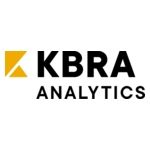NEW YORK--(BUSINESS WIRE)--KBRA Analytics releases this month’s edition of The Bank Treasury Newsletter, the Bank Treasury Chart Deck, and Bank Talk: The After-Show.

This month’s newsletter, Bank Treasurers Masked Up and Ready to Buy Bonds, discusses the meteoric rise in the 10-year Treasury yield, which has steepened the yield curve this quarter. Also discussed is why bank treasurers see its positive impact on the net interest margin blunted because bank interest rate exposure is generally concentrated in the front end of the yield curve and those Treasury rates are still relatively flat. Tying the market short on the 10-year Treasury to the Fed’s decision this month to let a temporary measure it adopted last year in response to COVID expire as scheduled at the end of this month, the newsletter explained why the decision fundamentally has changed nothing about the bond market’s complete dependence on the Fed as the main supplier of liquidity. Signaling the stress in Treasury markets this month, dealers reported that 10-year Treasury repo specials were trading as low as minus 1.9%, offering context for SOFR at 1 bp. Further exploring the implications of the transition at the end of 2021 from LIBOR to SOFR, the newsletter discusses how this shift will change the dynamics driving bank net interest margins.
Turning to the bond portfolio, the newsletter looks at why bank treasurers are now increasingly comfortable with shifting cash to the bond portfolio, even with rates remaining and likely staying lower for longer. Bank treasurers see the coincidence of a steepening yield curve and a growing pile of cash on their balance sheets as offering a chance to reduce their asset sensitivity, which increased from the inflow of noninterest-bearing deposits. A look at Fed data shows how the industry has been ramping up its purchase of Agency MBS since the summer, yet bank treasurers report that their cash balances at the Fed are building up at the same time because deposits continue to increase, by $2.2 trillion since the end of March 2020, and by $228 billion, since the new year, to $16.4 trillion this month. Despite the growing balance, bank treasurers are optimistic that the stimulus will encourage lending, even before the present surge in deposits begins to recede. Their optimism is shared across the broad capital markets, as nonbank investment managers, banks, and other investors report that the pipeline for deals, including mergers and acquisitions remains strong.
The Bank Treasury Chart Deck this month starts with a look at special purpose acquisition companies (SPACs) market, which so far in 2021 has been a driver of the equity markets and has not only eclipsed initial public offerings (IPOs) this year but already exceeds the total SPAC deals done in 2020. Then turning to the cryptocurrency market, which has also seen its share of market exuberance, the chart deck compares the combined market cap of the four largest domestic banks to the market cap of Bitcoin, at almost 1 for 1. Shifting from there to the buyside, which ultimately is powering these charging equity markets so far this year, the Chart Deck looks at the demand side, with the value of U.S. retirement assets nearly doubling over the past decade, and how the outstanding holdings of Agency MBS by the commercial banks compares with the Fed’s growing portfolio over the last year.
In this month’s edition of Bank Talk: The After-Show, Ethan and Van explore the legislative history of industrial loan bank charters over the past 100 years, and how these bank charters are a special loophole in a core tenet of banking regulation since the Glass-Steagall Act, prohibiting the mixing of commerce and banking. Van began by making the point that the FDIC’s decision last month to once again, after 15 years, resume approval of these charters, will mean that Google, Apple, and Amazon Bank will pose a significant challenge for the largest, traditionally chartered consumer banks, such as J.P. MorganChase, Citi, Bank of America, and Wells Fargo.
In response, Ethan pointed out that the industrial loan bank charter is limited in the range of activities it can do compared to a full commercial bank, most notably, that it cannot offer checking accounts. He goes through with Van the case of Walmart, and its recent hiring announcements of former bank executives at Goldman Sachs, and the argument for why an industrial loan bank charter is not an inevitable forgone conclusion. Ethan raises the fact that the environment for banking is not great, a point he underscored by noting the small number of bank applications for full commercial or industrial loan banks. As Ethan notes with Walmart, the company has managed—since it first applied for the special charter in 2005 and then pulled the application—to offer its customers a menu of banking products (including branch banking in its stores) through partnerships with existing full-chartered commercial banks without the cost and hassle that a bank charter poses, including submission to bank examinations and compliance with capital regulations.
Click below to view the reports:
- The Bank Treasury Newsletter Chart Deck: March 2021
- Bank Talk: The After-Show: March 2021
- The Bank Treasury Newsletter: March 2021
About KBRA Analytics
KBRA Analytics, LLC (KBRA Analytics) is our premier product platform for high quality data and advanced analytics. Our seasoned teams of industry specialists across each product provide unparalleled insight creating a foundation of deeper analysis and rapid discovery for users. KBRA Analytics is an affiliate of Kroll Bond Rating Agency, LLC (KBRA). KBRA is a full-service credit rating agency registered in the U.S., designated to provide structured finance ratings in Canada, and with credit rating affiliates registered in the EU and UK.
Contacts
Ethan M. Heisler, CFA
Strategy
+1 (516) 359-0975
ethan.heisler@kbra.com
Sales
Kai Chan
+1 (646) 731-2303
kai.chan@kbra.com